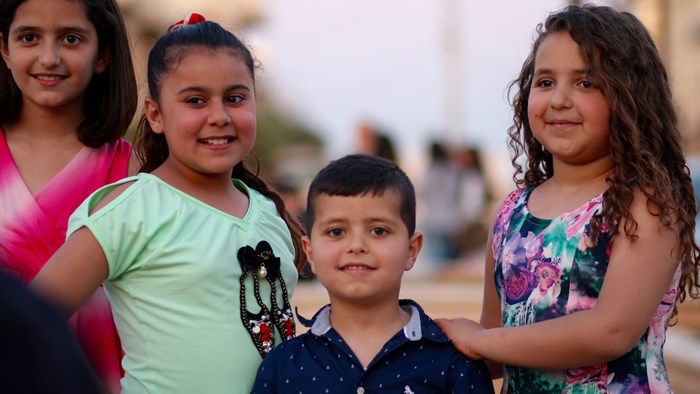How Well Do We Love the Strangers Among Us?

Introvert that I am, I have a hard time knocking on doors even when I’ve been invited, harder still if I don’t know anyone on the other side. But one day I accepted an invitation from a complete stranger to come to dinner. My hosts, whom I met for the first time that night, were recent refugees from Syria, a land suffering from years of civil war. Just weeks after arriving in this strange new country, they received word that several members of their family back in Syria had been killed in a bombing.
Facing the deepest grief of their lives during a time of personal upheaval, the family had no way to return home to grieve with their community and absolutely no community in this new country to grieve with. So they invited strangers. Several of us from the neighborhood and from church came that night, sitting in metal folding chairs pushed against the wall as men and women we didn’t know served us plate after plate of their favorite Syrian dishes. This family had lost everything dear to them, and the best way they knew to process their grief was to cook for strangers.
It is hard for me to understand what good it did for me to sit on that chair and eat plates heaped with food. Our hosts spoke only Arabic. We guests spoke English or Spanish. I used hand gestures to communicate my sympathy, but mostly I sat there for a long time, eating and sitting, sitting and eating. The family’s three-year-old daughter eventually climbed up on my pastor’s lap and stayed there for hours.
Though we had no language in common, we were fellow humans. We all know what it feels like to be afraid, to lose more love than we can live without. These strangers needed people to sit in their living room, so we came and sat. It was a never-to-be-forgotten honor.
In an essay exploring how the early church understood Jesus’ teaching, Gerhard Lohfink considers the biblical command to “love your neighbor as yourself,” the same command Jesus explored in the parable of the Good Samaritan. Lohfink concluded that the listeners of ancient Israel would have understood it this way:
“’Love your neighbor as yourself’ means: The help and solidarity that everyone in Israel owes his own relatives, especially his direct family, should be extended to all Israelites. The boundaries of one’s own family should be broken through so as to include the whole people of God as brothers and sisters—including strangers, and even those whom one’s family and relatives consider enemies. That is what Leviticus 19 is saying.”
Lohfink goes on to say that in telling this story the way he does, Jesus clarifies that the practice of caring for all fellow humans as neighbors—including strangers, even enemies—is inherently connected to loving God, one and the same thing.
The question of how we treat strangers is such a hot topic for social and political debate in our world today that it might be hard for us to remember who’s talking in this story: This is not a pundit or a reporter, not a conservative or a liberal. This is Jesus, the Son of God, from the right hand of the Father. Those of us who follow Jesus must take this seriously, regardless of the current political climate—and we cannot do it alone. The body of Christ is meant to be the community that cares for everyone inside the community, and everyone outside the community, as though they were our own family.
But is this commitment to loving strangers what we are known for?
In reality, many Christians in the United States are more likely to fear strangers than love them. In a recent study, PRRI reported that over 50 percent of white evangelical Christians considered immigrants a threat to their values and security, a far higher percentage than any other religious affiliation, and nearly twenty points higher than the population as a whole. When asked to describe their beliefs about immigrants, nearly half of evangelicals saw recent immigrants as an undesirable drain on economic resources. The majority of Americans in every demographic support welcoming refugees (a different legal classification from immigrants) into the United States—except for white evangelical Christians. Instead, the majority of white evangelicals favor preventing refugee resettlement in the USA. When asked what one factor influenced their thinking on these matters, only 12 percent of evangelicals cited Jesus or the Bible and only 2 percent cited their local church community or teaching. Only one in five evangelicals reported that their local church had encouraged them to reach out to immigrants in their community at all; the rest had never heard such a thing mentioned at church.
I wonder: If we asked Jesus how to gain eternal life, what parable would he tell us today?
--------
Note: This article is an excerpt from Fearing Bravely: Risking Love for Our Neighbors, Strangers, and Enemies by Catherine McNiel. Copyright © 2022. Used by permission of NavPress. All rights reserved. Represented by Tyndale House Publishers, Inc.
Catherine McNiel writes about the creative and redemptive work of God in our real, ordinary lives. She is the author of Fearing Bravely: Risking Love for Our Neighbors, Strangers, and Enemies, Long Days of Small Things: Motherhood as a Spiritual Discipline, and All Shall Be Well: Awakening to God's Presence in His Messy, Abundant World. Catherine studies theology while caring for three kids, two jobs, and one enormous garden. Visit Catherine on Facebook, Twitter, and Instagram.
The Better Samaritan is a part of CT's
Blog Forum. Support the work of CT.
Subscribe and get one year free.
The views of the blogger do not necessarily reflect those of Christianity Today.






















